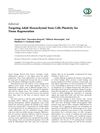
Search
for
Sort by
Research
150-180 / 1000+ results
research A Brief Overview of the Role of Drugs and Novel Methodologies on the Stability and Growth of Hair Follicles: An Approach Towards Hair Regeneration
Emerging therapies like stem cell and laser treatments show promise for hair regeneration.

research Hair Regeneration by Small Molecules That Activate Autophagy
Certain small molecules can help regrow hair by turning on the body's cell cleanup process.

research Mesenchymal Stem Cell-Derived Protein Extract Induces Periodontal Regeneration
MSC-protein helps regenerate gum tissue and bone.

research In Vitro and Ex Vivo Hair Follicle Models to Explore Therapeutic Options for Hair Regeneration
New methods to test hair growth treatments have been developed.

research Hair Follicle Morphogenesis During Embryogenesis, Neogenesis, and Organogenesis
The document concludes that understanding adult stem cells and their environments can help improve skin regeneration in the future.

research Hyaluronic Acid-Based Hydrogels for Full-Thickness Wound Repairing and Skin Regeneration
Hyaluronic acid-based HA2 hydrogel helps heal skin wounds better with less scarring.

research Cell and Cell-Free Therapies in Osteoarthritis
Some therapies using stem cells and platelet-rich plasma may help treat osteoarthritis, but more research is needed to ensure they are safe and effective.
research Organ Regeneration: Comprehensive Overview of Organogenesis and Next-Generation Regenerative Therapy
The book explains how to grow and repair organs using new lab techniques.
research PRC2 Preserves Intestinal Progenitors and Restricts Secretory Lineage Commitment
PRC2 is essential for maintaining intestinal cell balance and aiding regeneration after damage.

research Dermal Wnt/β-Catenin Activation Tunably Controls Hair Follicle Initiation
Activating Wnt in skin cells controls the number of hair follicles by directing cell movement and fate.

research Platelet-Derived Bio-Products: Classification Update, Applications, Concerns, and New Perspectives
Platelet-derived bio-products help in wound healing and tissue regeneration but lack standardized methods, and their use in medicine is growing.

research Functional Complexity of Hair Follicle Stem Cell Niche and Therapeutic Targeting of Niche Dysfunction for Hair Regeneration
Understanding how hair follicle stem cells work can help find new ways to prevent hair loss and promote hair growth.
research Temporal Layering of Signaling Effectors Drives Chromatin Remodeling During Hair Follicle Stem Cell Lineage Progression
Different signals work together to change gene activity and guide hair follicle stem cells to become specific cell types.
research M-CSF-Stimulated Myeloid Cells Can Convert Into Epithelial Cells to Participate in Re-Epithelialization and Hair Follicle Regeneration During Dermal Wound Healing
M-CSF-stimulated myeloid cells can turn into skin cells and help heal wounds and regrow hair.

research Targeting Adult Mesenchymal Stem Cells Plasticity for Tissue Regeneration
Adult mesenchymal stem cells can help regenerate tissues and are promising for healing bones, wounds, and hair follicles.

research Mechanical and Biological Properties of Keratose Biomaterials
Keratose, derived from human hair, is a non-toxic biomaterial good for tissue regeneration and integrates well with body tissues.
research Poly (ɛ-Caprolactone)–Chitosan–Poly (Vinyl Alcohol) Nanofibrous Scaffolds for Skin Excisional and Burn Wounds in a Canine Model
The scaffolds significantly sped up wound healing in dogs and were safe.

research Hair Follicle Stem Cell Progeny Heal Blisters While Pausing Skin Development
Skin healing from blisters can delay hair growth as stem cells focus on repairing skin over developing hair.

research Effect of Decellularized Extracellular Matrix Bioscaffolds Derived from Fibroblasts on Skin Wound Healing and Remodeling
A patch made from human lung fibroblast material helps heal skin wounds effectively, including diabetic ulcers.
research Biological Activity and Hair Inducing Function of Biomimetic Dermal Papilla Spheres Prepared by Hanging Drops of Methacrylate Gelatin
Biomimetic dermal papilla spheres can help regenerate hair to some extent.

research Applications and Implications of Heparin and Protamine in Tissue Engineering and Regenerative Medicine
Heparin and protamine are promising in tissue repair and organ regeneration, including skin and hair.
research Multimodal Molecular Analysis Reveals Divergent Trajectories of Wound Regeneration Versus Fibrosis
Verteporfin treatment in mice led to complete skin healing without scarring.

research Genome-Wide Maps of Histone Modifications Unwind In Vivo Chromatin States of the Hair Follicle Lineage
Hair follicle stem cells use specific chromatin changes to control their growth and differentiation.

research The Repairing of Full-Thickness Skin Deficiency and Its Biological Mechanism Using Decellularized Human Amniotic Membrane as the Wound Dressing
Human amniotic membrane helps heal skin wounds faster and with less scarring.

research Platelet-Rich Plasma in Cosmetic Surgery
Platelet-rich plasma may improve healing and hair growth in cosmetic surgery but results vary.

research Ephrins Negatively Regulate Cell Proliferation in the Epidermis and Hair Follicle
Ephrins slow down skin and hair follicle cell growth.

research Ox40-Cre-Mediated Deletion of BRD4 Reveals an Unexpected Phenotype of Hair Follicle Stem Cells in Alopecia
Deleting the BRD4 protein in certain skin cells causes hair loss and skin inflammation.
research Myristoleic Acid Promotes Anagen Signaling by Autophagy Through Activating Wnt/β-Catenin and ERK Pathways in Dermal Papilla Cells
Myristoleic acid helps hair growth by boosting cell growth and recycling processes in hair follicle cells.

research An Underlying Mechanism of Hair Loss in Acrodermatitis Enteropathica
Zinc deficiency disrupts hair growth and cycle, but zinc supplements can fix this.